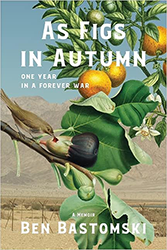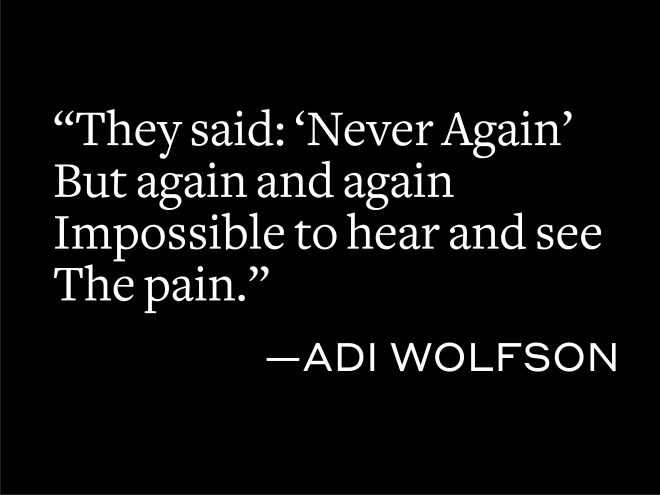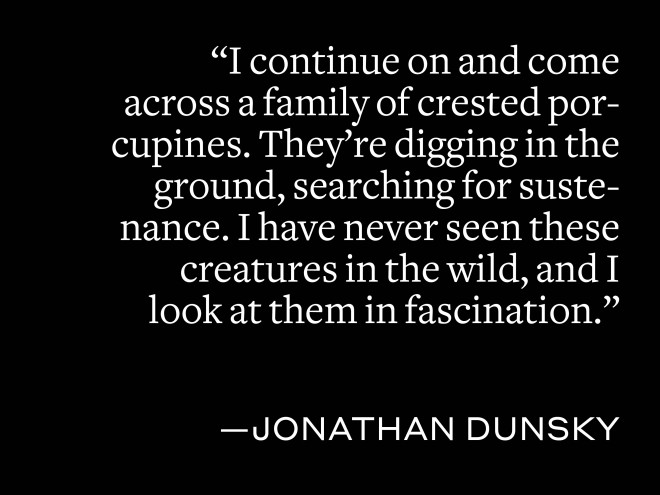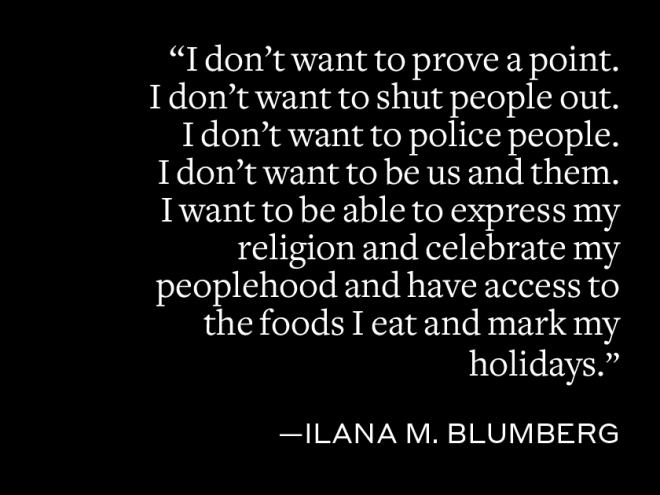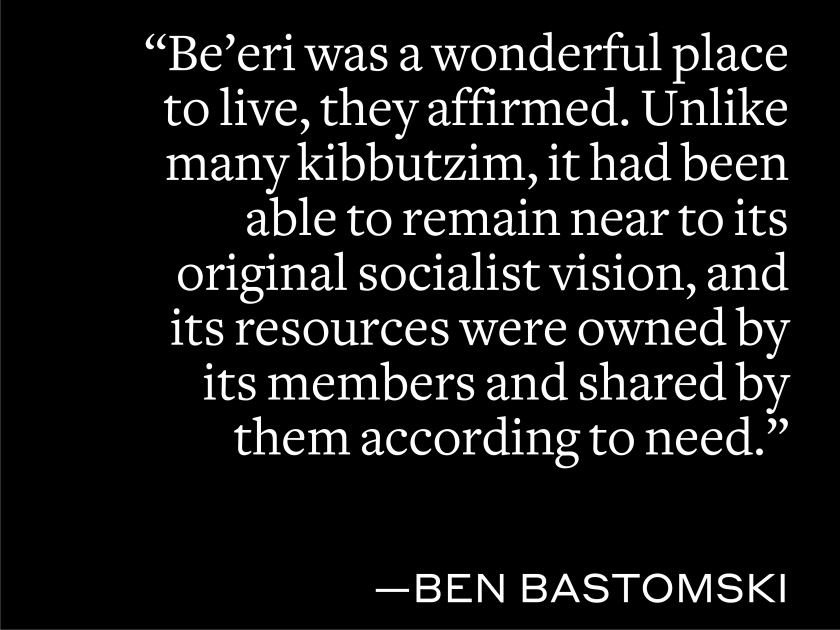
This piece is one of an ongoing series that we will be sharing in the coming days from Israeli authors and authors in Israel.
It is critical to understand history not just through the books that will be written later, but also through the first-hand testimonies and real-time accounting of events as they occur. At Jewish Book Council, we understand the value of these written testimonials and of sharing these individual experiences. It’s more important now than ever to give space to these voices and narratives.
In collaboration with the Jewish Book Council, JBI is recording writers’ first-hand accounts, as shared with and published by JBC, to increase the accessibility of these accounts for individuals who are blind, have low vision or are print disabled.
In this sequence from As Figs in Autumn: One Year in a Forever War (Delphinium, July 2023), Ben Bastomski, an American lone soldier who enlisted in the Israeli Defense Force, meets his adoptive family at the Be’eri Kibbutz. The loving portrait the author paints both of his adopted family, and the idyllic life on the Kibbutz, ends with the description of a bomb shelter. This passage marks a time period of a little more than ten years ago.
Last summer, the author moved back to Israel. And during the recent invasion of the Be’eri Kibbutz, he happened to be visiting his adopted family for the holiday of Simchat Torah. Ben and the family hid in a fortified safe room, and it was only through his and Izzy, his adopted father’s determined efforts, that they were able to keep “the executioners,” as Bastomski calls them, from breaking through the door. They were eventually rescued by Israeli soldiers. As the world now knows, more than 100 people in Be’eri were killed.
There is in the Negev a fleeting season, at the end of winter and the cusp of spring, in which the desert erupts into red bloom. These kalaniot (red anemones) are drawn forth by winter’s cool and rain, and they overtake the landscape, engulfing it in a mesmerizing scarlet. Because the kalaniot will stay only a short time before ebbing into the hills under the heat of spring, many Israelis flock south to be awed by them before they go: in particular to the western Negev, along the Gazan border, where the conditions bring the kalaniot to grow richest and fullest. I had not before known of the kalaniot, so on my bus westward across the desert, toward bayit, I sat alone at the window and watched these dunes breathe in red. I had no name for this wonder and needed none, instead discovering for the first time the way the hills bled deeper and more gorgeous red as I continued to draw nearer the border.
I thought about meeting Izzy, the father of my new family and the only one whose name I had so far been given. It was a blessing he had not answered my call for adoption till now, for in this time of waiting, my broken toe had healed, my Hebrew had taken leaps and bounds, and a sharpshooter’s M4A1 now rested on my lap. Eli had housed me as an infant, performed my upsherin, sheltered me in my regression — and yet I was glad Izzy would not meet that limping infant; that he would meet something closer to a man, one who would step off the bus and look him in the eye as we shook hands, as a father and a grown son might.
And I found him there on the open green, past the yellow guarded gate at the entrance to the kibbutz, into where rolled the fields and flowers and the graveled paths. He waited there and he knew who I was, because he had seen my adoption mug shot and now saw the way I came, armed and in uniform but looking for home. As I walked to my father but before we shook hands or said a word, he glanced down at the weapon I carried, my M4A1 with its scope and bipod. He did not comment, but I knew what he knew — and I felt a swell of pride in my jaw as he welcomed me, and as he turned to lead the way to the home where Noga, his wife and my mother, waited for us.
She had baked a plate of cookies for me, her second act of unconditional love. Her third was to wave to me from the front doorway, hug me and say they had been longing to meet me, and hoped I would accept to stay. She did not know I had accepted them before I got on the bus, accepted them again as it rolled past the beds of throbbing red hills, and accepted them once more as Izzy smiled on the field, all before I had found her, calling and waving from under the doorway of home.
On Friday two weeks later, I came back through the yellow gate into Be’eri as a resident for the first time. Today I would also meet Izzy and Noga’s three children: my sister Paz of ten years; brother Arad, eight; and littlest sister Dotan, six, who would all soon be coming home from school. For now, mother, father, and son sat in the shade outside and ate ripe oranges from the kibbutz’s orchards, and I began to learn from them of Be’eri, of her work at its laundry center and his as groundskeeper of its petting zoo down the way. Be’eri was a wonderful place to live, they affirmed. Unlike many kibbutzim, it had been able to remain near to its original socialist vision, and its resources were owned by its members and shared by them according to need. Vital work like theirs was no less or more than the roles others filled, to meet the community’s needs. Due to Be’eri’s size and resources, it was a cultural center in this rural region, and its amphitheater was a frequent stop for musicians or speakers touring the area. It had about a thousand residents, which was large for a kibbutz, but small enough that there were no strangers. The children were free to leave and play in the morning and come home in the afternoon, and they locked no doors on the houses that did not belong to them anyway. Be’eri had, really, everything it needed, and certainly everything that they did.
I sat and listened, and these were impossibly sweet bursting oranges, and I was on my third when my three siblings arrived home in a sudden row, one after the other, each of them lighting up and running with the things they carried, down the path to come meet me.
Arad was first home, stocky and bright-eyed, and I stood to hug him as he bolted toward me. We paused to set down our things, I my rifle and he the crayon drawings he had brought from class, so that he could jump into my arms without obstruction. I remembered then the rule that I was not ever to set down my rifle while away from base unless securing it behind two locks, so I put its strap back on my shoulder as Arad showed me what he had drawn.
Paz came next quietly with her backpack. She came to hug me, and paid an attention to my rifle that Arad had not, stood back with a new look brimming with questions. We sat and she started strong, asking why I was here. I was again glad to have grown my Hebrew before arriving: whether or not my family knew any English, Hebrew was what they spoke, so it was what I would speak with them. I had not been asked this question in some time, and this one was easier than the same one Dror had asked on the bus — easier to locate Hebrew words, easier to know which ones I wanted. She had asked why I was here, not what brought me here: reasons, not causes, which meant my answer was not limited to things I knew before arriving. I began with Santa Barbara, where I was born. Then I had started trying to spell out reasons, and to name the people behind them, when another person appeared on the path: my third sibling.
Dotan was last, and carried nothing. A strikingly pretty little girl whose blue eyes sparkled in the daylight and blond braids flowed behind her as she ran, and jumped high into my arms for her first hello. Instead of coming back down from our hug, she climbed farther, swung around onto my shoulders, and planted herself in seated position. She took hold of scraps of my buzzed hair at the sides of my head and began to nudge them left, right, and forward, to direct my movement for her joyride, my guided tour.
And so we took off, Dotan and I. And I waved to the others and said we would be back; Izzy and Noga laughing at the two of us. They did not seem troubled that my M4A1 — the one Izzy had known instantly — still hung low, unloaded, SAFE, from a leather strap on which their daughter’s legs rested. Dotan, who sat at the helm making machine sounds while I trod beneath her weight, gave no hint of trouble either.
“Kadima (Forward)!” And we were off down the path, Dotan pointing left and right, naming the houses of friends we passed, the gardens, the cheder ochel (communal dining hall), the playground before it. This was where my function changed, because she dismounted to run to the swing and called for a big push. I gave her one and then another, and it was between these pushes, standing on the sand while she held on and flew, that came my first spare moment to collect all that had welled up within me in the hour since arriving through the yellow gate. “T’nadned oti (Push me)!” I gave her another push, and she laughed and flew again, higher than before. The sunlight had grown orange around us, and I had not thought how long we had been there. But I remembered I was hungry when she said we should go get ready for Shabbat dinner. She began to lead us back toward the house, pausing first along the way to name a new stop on the tour.
“Do you know Tzeva Adom?”
I did; I was familiar with this term. Red Color. Despite its plain name, it referred not to a color but to mortal danger: it was the name given to the automatic alarm system of Be’eri and other communities in the region that came under the shadow of rocket attacks from Gaza. Qassam, Grad, Katyusha, and other rockets, of varying range and capacity, all of them incapable of precision, all of them fired for precisely this reason. Fired for this unstable lethality, so that neither prey nor hunter could tell you where was safe and where was death; fired for the way those two thus began to blend boundaries, for the way this crude rocket’s deathliness was not contained but leaked, crop-dusting tiny bits of death as it flew. Fired by a hunter aiming less to kill his prey than keep it bounding wide-eyed forever; fired for the violence the rocket inflicted while still soaring high in the air, spreading its black and growing shadow on the earth below.
And so upon detection of a fired rocket, this alarm fired on loudspeakers gripping the kibbutz, sufficient to jar you from sleep or where else you may have drifted. No shrill siren, no earsplitting horn — instead, in one recorded female voice, Red Color, words a six-year-old knew. She called four times, and though she kept one calm tone throughout, her first call was a warning and her last a proclamation punctuated by explosion: Tzeva Adom (and time to drop everything and run, sheltering time varying by location), Tzeva Adom (but in the case of Be’eri so near the border, about fifteen seconds), Tzeva Adom (screams filling the space between her words), Tzeva Adom, impact.
“Yes, I know of it.”
“Good, you know, if you are at the playground when you hear it, you run to this shelter and leave your things behind no matter what.”
She had stopped and pointed again, and I had not noticed what we walked past as we left the playground — but it was a concrete shelter, a red sign at its entrance. I stopped now, too, there with her as she pointed at the bold red letters on the shelter and waited for me to read.
Excerpted from As Figs in Autumn: One Year in a Forever War by Ben Bastomski. Published by Delphinium Books.
The views and opinions expressed above are those of the author, based on their observations and experiences.
Support the work of Jewish Book Council and become a member today.
Ben Bastomski, a Southern California native and Israel Defense Forces veteran, moved to Santa Monica, CA to practice law after graduating from Harvard Law School in 2015. In the years since, Ben has become an accomplished civil litigator, while pursuing a parallel career as a fashion model with a Los Angeles talent agency. He has recently returned to live in Israel and is now based in Jerusalem. Ben was raised in a Jewish home with a love of furry and feathered animals, creation myths, and the outdoors. Among his most beloved childhood memories were the signings he attended at his favorite local bookstore, Chaucer’s Books. As Figs in Autumn is his debut book.
